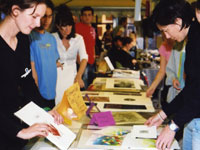 |
|
 |
| |
| |
| |
| |
| |
| |
| |
Campus: Kensington Campus
| |
| |
Career: Undergraduate
| |
| |
Units of Credit: 6
| |
| |
| |
| |
Indicative Contact Hours per Week: 3
| |
| |
Enrolment Requirements:
| |
| |
Prerequisite: 30 units of credit at Level 1
| |
| |
Equivalent: HIST2661
| |
| |
Excluded: HIST2670, HIST2671
| |
| |
| |
| |
| |
| |
| |
| |
| |
 |
|
 |
This is a shelf course. A shelf course comprises a number of modules related to this broad area of study. Each module is a separate semester of study in this area and is offered in rotation. You can study TWO modules but you cannot study the same module twice.
|
Subject Area: History
This course can also be studied in the following specialisations: Archaeology
Module: “Classical Greece” (Semester 1, 2011)
This module explores the dynamic, diverse, and troubled civilisation of Greece during the Archaic, Classical, and early Hellenistic eras (circa 750-200 BC). We will begin by seeking the origins of polis-based Greek civilization, and then trace its evolution during the Archaic Era (circa 750-500 BC). After exploring reasons underlying the startling Greek triumph over the Persian Empire in the early 5th century BC, the course goes on to examine the two-century arc of triumph and failure of Classical Greek polis civilization (ca. 500-338 BC). Finally, we will turn to Alexander the Great, his conquests, the division of his empire upon his death, and the uneasy balance of power between the Hellenistic Successor Kingdoms (ca. 338-200 BC). Several themes will animate the course: the origin, nature, and evolution of economic and social structures; the origin, nature, and evolution of military and political institutions and practices; Greek democracy; Greek interaction with non-Greeks.
Module: “Europe in the Middle Ages”
This module explores European and Mediterranean history from the Late Roman Empire through the beginnings of the Renaissance and Reformation (ca. AD 300-1550). The course will begin by setting the stage with a brief retrospective of the Roman Empire and early Christianity. It then examines the transformations of Late Antiquity, including various “barbarian invasions”, fragmentation of the Roman Empire, the emergence of the Byzantine Empire, and the rise of Islam. Next, the course will follow political, economic, cultural, and religious developments across the Early and High Middle Ages. A number of themes will animate the course: religion and politics, the search for governable political units, economic structures and everyday life, the role of women in society, and the dynamics of intercultural relationships. We will conclude with the radical changes of the Later Middle Ages: the onset of the Renaissance and religious “heresies” that produced the Reformation.

